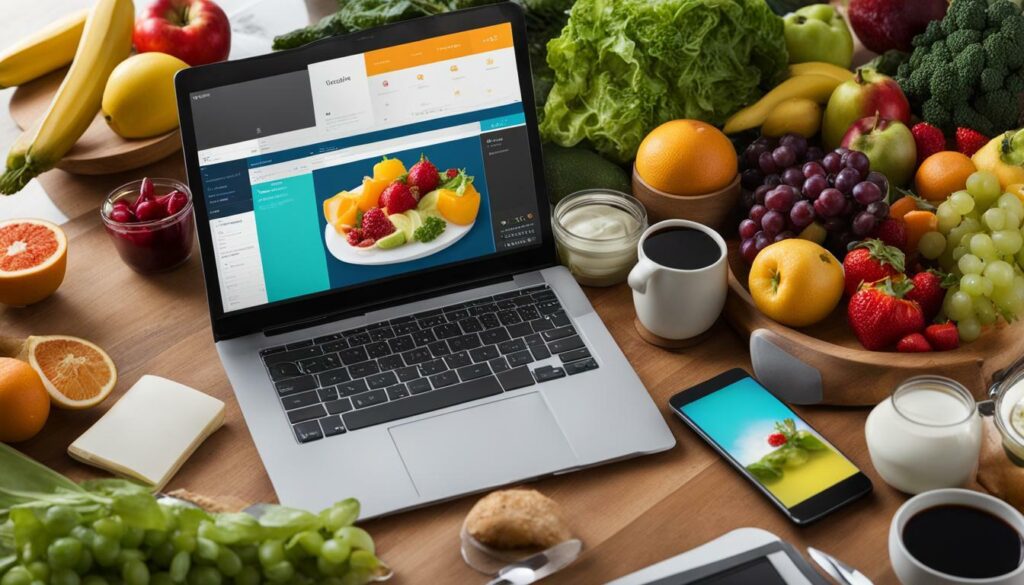Powering Productivity: The Link Between Healthy Eating and Efficient WFH

Working from home (WFH) can present unique challenges when it comes to maintaining a healthy diet. With easy access to snacks and the convenience of cooking at any time of day, it’s easy to fall into unhealthy eating habits that can impact your cognitive function and work performance.
However, by prioritizing healthy cooking for WFH and considering the dietary impact on work, you can optimize your productivity and overall well-being. In this article, we will explore the connection between healthy eating and efficient WFH routines. Discover the impact of diet on your cognitive function and how it can boost your productivity. Learn about the benefits of a balanced diet for optimal health and work efficiency.
- Healthy cooking for WFH can significantly enhance your cognitive function and productivity.
- Your food choices can influence your energy levels, mental clarity, and overall work performance.
- Fueling your body with energy-boosting foods is crucial for maintaining focus and productivity throughout the day.
- Meal prepping can save you time, enhance your productivity, and support your overall wellness.
- Creating a productive work environment goes beyond having the right equipment and tools.
The Role of Nutritional Habits in WFH Productivity
When you’re working from home, establishing healthy nutritional habits is essential for sustaining productivity. Your food choices can influence your energy levels, mental clarity, and overall work performance. Maintaining a balanced and nutritious diet is key to supporting your WFH routine and boosting productivity.
That’s why it’s crucial to develop good nutritional habits. Eating a balanced diet that includes plenty of fruits, vegetables, whole grains, and lean proteins can help you stay focused and energized throughout the day. Avoiding junk food and processed snacks can prevent post-lunch crashes and keep you on track for a productive workday.
Incorporating healthy snacks into your WFH routine can also help keep you on track. Opt for snacks that are rich in protein and fiber, such as nuts, seeds, and fresh fruit. These foods will help keep you full and satisfied between meals, preventing distracting hunger pangs and sugar crashes.

Another important aspect of developing good nutritional habits while working from home is taking the time to prepare healthy meals. Meal prepping can save you time and ensure that you have nutritious options readily available. Schedule time to plan and prepare meals in advance, ensuring you have plenty of healthy options for the week ahead.
Incorporating good nutritional habits into your WFH routine can help you stay focused, energized, and productive throughout the day. By taking the time to plan and prepare healthy meals and snacks, you can support your overall health and well-being while achieving your remote work goals.
Boosting Energy with Energy-Boosting Foods
When working from home, it can be easy to succumb to unhealthy snacking habits or reach for caffeine to power through the day. However, these quick fixes may provide short-term energy boosts, but they can also lead to energy crashes and decreased cognitive function.
To maintain focus and productivity throughout the day, fueling your body with energy-boosting foods is crucial. Incorporating nutrient-dense meals and snacks into your diet can provide sustainable energy and enhance cognitive function.
Introducing antioxidant-rich foods, such as berries, leafy greens, and nuts, can help reduce oxidative stress and inflammation in the brain, promoting optimal cognitive function. Omega-3 fatty acids, found in fatty fish and chia seeds, can also support brain health and improve mental clarity.

Consider incorporating colourful vegetables, whole grains, and lean proteins into your meals to ensure a balanced diet and energy stability. Additionally, avoiding highly processed and sugary foods can prevent energy crashes and improve overall well-being.
By incorporating energy-boosting foods into your work-from-home routine, you can sustain focus and productivity throughout the day, while also supporting your cognitive and overall health.
Meal Prep for Productivity: Mastering Your WFH Routine
If you’re working from home, meal prepping can be a game-changer when it comes to maintaining a balanced diet and optimizing your work-from-home routine. By planning and preparing meals in advance, you can ensure you have nutritious options readily available, saving you time and enhancing your productivity.
When it comes to meal prep for productivity, it’s important to keep a few things in mind. Firstly, make sure you’re incorporating a variety of foods to create a balanced diet. This should include plenty of fruits and vegetables, lean proteins, and whole grains.
Secondly, make sure you’re planning your meals around your schedule. If you typically have busy mornings, consider preparing overnight oats or smoothie bowls that you can grab and go. If you have a bit more time in the morning, preparing a breakfast sandwich or avocado toast can be a satisfying and nutritious start to your day.
When it comes to lunch and dinner, consider batch cooking. This involves preparing large quantities of a particular dish (such as a stir-fry or chilli) that you can divide into portions and store for later. This way, you’ll have healthy meal options available throughout the week, without the hassle of daily cooking.
Finally, make sure you have plenty of healthy snacks on hand. This can include things like pre-cut fruits and vegetables, hummus, nuts, and seeds. By having these items readily available, you’ll be less likely to reach for unhealthy snacks or skip meals altogether.
| Benefits of Meal Prep for Productivity |
|---|
| 1. Time-saving |
| 2. Enhanced productivity |
| 3. Healthier food choices |
| 4. Reduced stress during the workday |
| 5. Cost-effective |
Investing time in meal prep can pay off in multiple ways. Not only can it save you time and money in the long run, but it can also help you make healthier food choices and reduce stress during the workday.
With meal prep for productivity, you can take control of your work-from-home routine, supporting a balanced diet and optimal wellness.

Staying properly hydrated is key to maintaining work efficiency and supporting your physical health while working remotely. Dehydration can cause fatigue, dizziness, and poor concentration, which can negatively impact your work performance. By prioritizing hydration, you can improve your cognitive function and boost your productivity.
When working from home, it can be easy to forget to drink enough water throughout the day. To ensure you stay hydrated, keep a water bottle on your desk and aim to drink at least 8-10 glasses of water per day. You can also incorporate other hydrating beverages such as herbal teas and fruit-infused water.

In addition to water, consuming foods with high water content can also contribute to your hydration goals. Fruits and vegetables such as cucumber, watermelon, grapefruit, and spinach are all packed with water and can help keep you hydrated throughout the day.
It’s important to note that hydration not only improves your work efficiency but also supports your physical health during remote work. Staying hydrated helps regulate body temperature, aids in digestion, and promotes healthy skin. By prioritizing hydration, you can maintain your overall well-being while working from home.
The Importance of Mindful Eating for Sustainable Eating Habits While Working from Home
Working from home can often disrupt our established eating habits. With the fridge and pantry always within reach, it’s easy to succumb to unhealthy snacking and overeating. However, practicing mindful eating can help create sustainable eating habits that support your overall well-being.
Mindful eating involves paying attention to the food you’re consuming, including its taste, texture, and smell, and tuning into your body’s hunger and fullness signals. By doing so, you can avoid mindless snacking and unnecessary overeating, reducing the risk of weight gain and chronic health issues.
Here are some tips for incorporating mindful eating into your work-from-home routine:
- Take breaks: Allow yourself time away from your work to fully focus on your meal or snack. Avoid eating while working or multitasking, as this can lead to mindless overeating.
- Engage your senses: Before eating, take a moment to appreciate the visual and olfactory aspects of your food. Notice the colours, textures, and aromas of your meal or snack.
- Eat slowly: Savour each bite and chew thoroughly. Pay attention to the flavours and textures of the food.
- Listen to your body: Tune in to your body’s hunger and fullness signals. Eat when you’re hungry and stop when you’re comfortably full.
- Eliminate distractions: Turn off the TV and put away your phone during meals to fully focus on the experience of eating.
By practicing mindful eating, you can cultivate sustainable eating habits that support your health and well-being while working from home.

When it comes to staying focused and productive while working from home, the food you consume plays a critical role. Food and focus go hand in hand, with certain nutrients and dietary patterns influencing cognitive function and mental clarity.
Research has shown that an unbalanced diet with too much sugar and processed foods can lead to impaired memory, decreased productivity, and decreased creativity. On the other hand, a diet rich in whole foods, healthy fats, and antioxidants can promote mental clarity, memory retention, and creativity.
By incorporating foods that are high in cognitive function and nutrition into your work-from-home diet, you can boost your focus and improve your work performance. Some of the best foods for focus include:
| Food | Nutrients |
|---|---|
| Dark leafy greens (kale, spinach) | Vitamins C and K, iron |
| Fatty fish (salmon, tuna) | Omega-3 fatty acids |
| Nuts and seeds (walnuts, flaxseed) | Omega-3 fatty acids, vitamin E |
| Whole grains (brown rice, quinoa) | B vitamins, magnesium |
| Berries (blueberries, strawberries) | Antioxidants, vitamin C |
It’s also important to avoid foods that can impair cognitive function and hinder productivity. This includes sugary snacks, processed foods, and excessive caffeine.
By making mindful food choices throughout the day and eating a variety of nutrient-dense foods, you can support your cognitive function and fuel your focus while working from home.

When it comes to working from home, creating a productive work environment goes beyond having the right equipment and tools. A key factor in promoting productivity and overall well-being in your home office is maintaining a balanced diet and proper nutrition. Here are practical tips for optimizing your workspace, incorporating movement breaks, and minimizing distractions to enhance your work-from-home routine.
Optimize Your Workspace
It’s essential to have a workspace that is comfortable and conducive to productivity. Ensure that your desk and chair are at the right height, providing good posture and adequate support to prevent back pain and eye strain. Organize your workspace and minimize clutter to reduce distractions and improve your concentration.
Incorporate Movement Breaks
Sitting at a desk for long periods can lead to physical health problems and affect your productivity. Therefore it’s essential to incorporate movement breaks throughout your workday. Take a brisk walk, stretch, or do a few yoga poses to improve circulation, reduce stress, and improve your cognitive function. Get inventive with this by setting a timer or a reminder on your phone to remind yourself to take a short break every hour or so.
Minimize Distractions
Working from home can come with many distractions that can interrupt and disrupt your workflow. Minimize these by creating a dedicated workspace away from household distractions such as children, pets and other noise. Besides, it’s essential to have a clear plan for your workday, having a to-do list or schedule that can keep you on track and avoid losing time while working from home.
Image:

“A well-designed workspace is an essential component of a productive work environment, but it’s also critical to take frequent movement breaks, minimize distractions, and stick to a plan to optimize your work-from-home routine.”
By following these tips for creating a productive work environment, you can minimize the negative effects of remote work and maintain your work efficiency. Remember that a balanced diet and proper nutrition also play a critical role in promoting productivity and overall well-being. A nutritious meal can not only refuel your body but also provide the energy and focus required for efficient remote work. Therefore, it’s vital to maintain a balanced diet while working from home.
The Power of Cognitive Function in Work Performance
When working from home, cognitive function plays a critical role in your work performance. Your ability to think critically, problem-solve and remain focused amidst distractions can make a big difference to your productivity and efficiency. Nutrition and a balanced diet have a direct impact on cognitive function, and therefore, can play a key role in optimising your work-from-home routine.
There are certain nutrients that are particularly effective in supporting cognitive function, including Omega-3 fatty acids, Vitamin E, and B-vitamins. Omega-3 can be found in walnuts, flaxseed, and salmon; Vitamin E is found in almonds, avocado, and spinach, while B-vitamins can be sourced from leafy greens, whole grains, and lean proteins.
Studies have shown that diets rich in fruits, vegetables, whole grains, and lean proteins are associated with better cognitive function, improved memory, and a reduced risk of cognitive decline. On the other hand, diets high in processed foods, sugars, and saturated fats have been linked to decreased cognitive function, memory problems, and an increased risk of dementia.
Incorporating nutrient-dense foods and a balanced diet into your work-from-home routine can help support cognitive function, reduce brain fog, and enhance your focus and concentration. Elevated cognitive function can contribute to increased work productivity and overall well-being, making it an essential consideration for anyone engaged in remote work.

Aside from diet, there are other strategies you can implement to support cognitive function while working from home. For example, regular exercise, staying hydrated, and managing stress levels can all contribute to cognitive health. Consider incorporating these practices into your daily routine, along with a balanced and healthy diet, to help support optimal cognitive function and work performance.
In the next section, we will explore the relationship between physical health and remote work, and the importance of a balanced diet and regular physical activity for maintaining productivity and well-being while working from home.
The Link Between Physical Health and Remote Work
Working from home (WFH) offers many benefits, but it also presents unique challenges that can affect your physical health. When your office is also your home, it’s easy to fall into sedentary habits and neglect physical activity. However, maintaining a balanced diet and regular exercise routine is essential for long-term productivity and overall well-being.
A balanced diet is one of the most critical factors in maintaining good physical health while working remotely. When you have control over your meals, it’s crucial to be mindful of what you consume. A balanced diet includes nutrient-dense foods such as fruits, vegetables, whole grains, lean proteins, and healthy fats. These foods provide the necessary vitamins and minerals to support your immune system and help you stay energized and focused throughout the day.
Getting regular exercise is equally important. Sitting for prolonged periods can result in negative health effects, such as back pain and poor circulation. Incorporating physical activity into your WFH routine can help combat these issues. Try to take movement breaks throughout the day, such as stretching, doing a short workout routine, or taking a quick walk outside.

Creating a productive work environment also means taking care of your physical health. Consider investing in a comfortable chair, standing desk, or other ergonomic equipment to reduce strain on your body. Additionally, avoid distractions that may interfere with your physical health, such as working near a television or constantly snacking on unhealthy foods.
In conclusion, prioritizing a balanced diet and regular exercise routine is essential for optimizing productivity and overall well-being when working from home. Be mindful of what you consume, take regular movement breaks, and invest in a healthy work environment to support your physical health and work efficiency.
Nutritional Tips for Telecommuting Success
Working from home can be challenging when it comes to maintaining a healthy lifestyle. Without the structure of a traditional office setting, it can be easy to fall into unhealthy eating habits and neglect physical activity. However, with the right nutritional tips for telecommuting, you can fuel your body and mind for optimal productivity and holistic wellness.
To support your work-from-home routine, try incorporating the following nutritional tips:
1. Plan Your Meals and Snacks
Meal planning can help you make healthier choices and avoid unhealthy snacking throughout the day. Set aside time each week to plan your meals and snacks, and consider prepping meals in advance to save time and ensure you have balanced options readily available.
2. Prioritize Nutrient-Dense Foods
Choosing foods that are rich in nutrients can help you maintain energy levels and cognitive function throughout the day. Focus on incorporating plenty of fruits, vegetables, whole grains, lean protein, and healthy fats into your diet.
3. Stay Hydrated

Proper hydration is crucial for both physical and mental health. Keep a water bottle nearby and aim to drink at least 8 glasses of water each day. You can also incorporate hydrating foods, such as watermelon or cucumber, into your diet.
4. Practice Mindful Eating
Take time to savor and enjoy your meals, and listen to your body’s hunger and fullness cues. Avoid distractions while eating, such as working or watching TV, and focus on the nourishment and satisfaction that food provides.
5. Incorporate Movement Breaks
Sitting for long periods can be detrimental to your health and productivity. Incorporate movement breaks throughout the day, such as stretching, walking, or practicing yoga, to stay energized and enhance cognitive function.
By implementing these nutritional tips for telecommuting, you can support your holistic wellness and optimize your work-from-home routine for increased productivity and overall well-being.
Concluding Thoughts on Healthy Cooking for WFH and Cognitive Function
As we conclude our exploration of the link between healthy eating and efficient work-from-home routines, it becomes clear that dietary habits play a significant role in cognitive function and work productivity.
Incorporating nutrient-dense meals and snacks, practicing mindful eating, and staying hydrated are just a few ways you can optimise your work-from-home routine to support your overall well-being and enhance productivity.
Remember, meal prepping can be a game-changer when it comes to maintaining a balanced diet and optimising your work-from-home routine. By planning and preparing meals in advance, you can save time, enhance your productivity, and support your overall wellness.
Additionally, creating a productive work environment that encourages movement, minimises distractions, and optimises cognitive function can enable you to maximise your work-from-home efficiency.
Finally, prioritising your physical health through regular exercise and healthy eating habits can help mitigate the negative effects of sedentary work and promote optimal well-being in the long run.
Investing in your health and well-being through healthy cooking for WFH and considering the dietary impact on work can help enhance your cognitive function and productivity, ultimately leading to telecommuting success.
FAQ
Q: How does healthy eating affect work-from-home (WFH) productivity?
A: Healthy eating can have a positive impact on WFH productivity. A balanced diet that includes nutritious foods can enhance cognitive function, boost energy levels, and support overall work performance.
Q: What role do nutritional habits play in WFH productivity?
A: Nutritional habits are crucial for sustaining productivity while working from home. The food choices you make can influence your energy levels, mental clarity, and overall work performance. Maintaining a balanced and nutritious diet is key to supporting your WFH routine.
Q: How can energy-boosting foods enhance productivity in a WFH setting?
A: Consuming energy-boosting foods can help maintain focus and productivity throughout the day. Nutrient-dense meals and snacks that provide sustainable energy can enhance cognitive function. Foods rich in antioxidants and essential nutrients are especially beneficial for your WFH diet.
Q: What are the benefits of meal prep for productivity in a WFH routine?
A: Meal prepping can save time and support a balanced diet while working from home. Planning and preparing meals in advance ensures you have nutritious options readily available, enhancing productivity and overall wellness in your WFH routine.
Q: Why is hydration important for work efficiency in a remote setting?
A: Staying properly hydrated is crucial for maintaining work efficiency and supporting physical health while working remotely. Dehydration can negatively affect cognitive function. Incorporating proper hydration into your WFH routine is essential.
Q: How does mindful eating contribute to holistic wellness while working from home?
A: Mindful eating can help you make healthier food choices, improve digestion, and enhance overall well-being during WFH. It involves being present and fully engaged with your eating experience, fostering a better relationship with food and supporting your productivity.
Q: How does food impact focus and concentration?
A: The food you consume directly affects your ability to focus and concentrate. Certain nutrients and dietary patterns can influence cognitive function and mental clarity. Incorporating focus-enhancing foods and implementing dietary strategies can optimize your work environment for increased productivity.
Q: How does a balanced diet and proper nutrition promote productivity in a remote work environment?
A: Creating a productive work environment involves more than just having the right equipment and tools. A balanced diet and proper nutrition play a crucial role in sustaining productivity and overall well-being while working from home. Optimizing your workspace, incorporating movement breaks, and minimizing distractions are also important.
Q: What is the connection between cognitive function and work performance in a remote setting?
A: Cognitive function is vital for work performance, especially in a remote setting. The connection between nutrition, cognitive function, and productivity is significant. Certain nutrients support brain health, and adopting dietary strategies can help optimize your cognitive function for improved work performance.
Q: How does physical health relate to remote work, and why is a balanced diet important?
A: Maintaining physical health is essential for long-term productivity and well-being when working from home. A balanced diet, regular exercise, and incorporating movement breaks are crucial in mitigating the negative effects of sedentary work. Prioritizing physical health supports your overall WFH routine.
Q: What are some nutritional tips for telecommuting success?
A: To succeed in telecommuting, consider sustainable eating habits, managing stress-related eating, and promoting holistic wellness. Maintain a healthy work-life balance, nourish your body and mind, and incorporate practical strategies into your WFH routine.
Q: How does healthy cooking for WFH and cognitive function relate?
A: Prioritizing healthy cooking for WFH and considering the dietary impact on work can significantly enhance cognitive function and productivity. Sustainable eating habits, mindful eating, and fueling your body with nutrient-dense meals create a supportive work environment and optimize overall well-being while working remotely.
